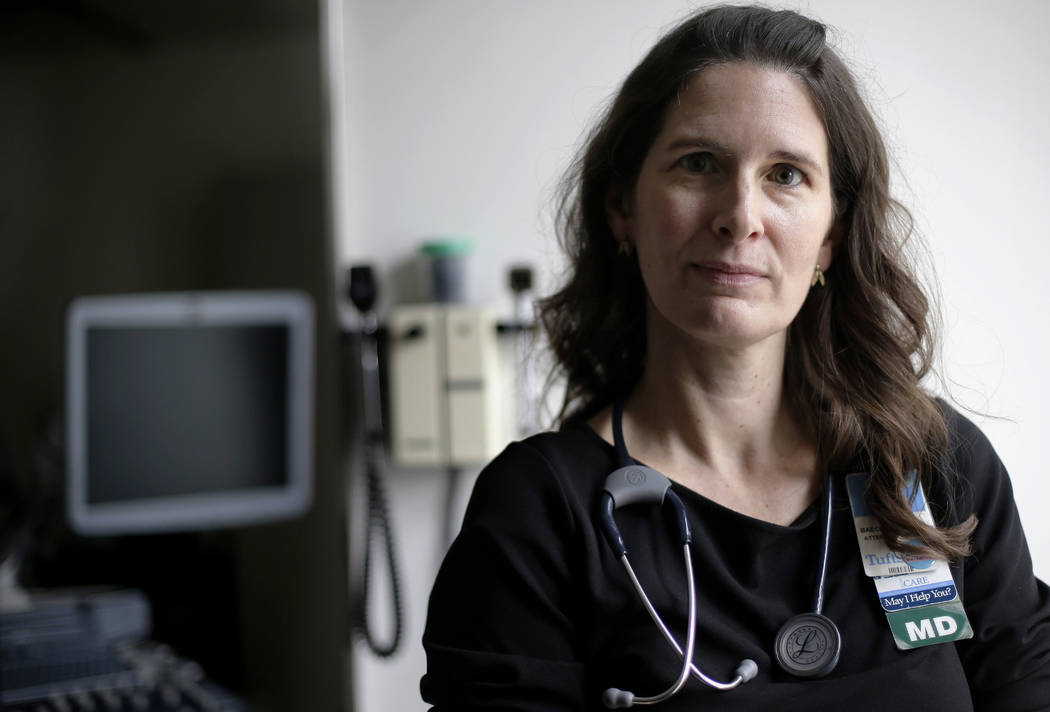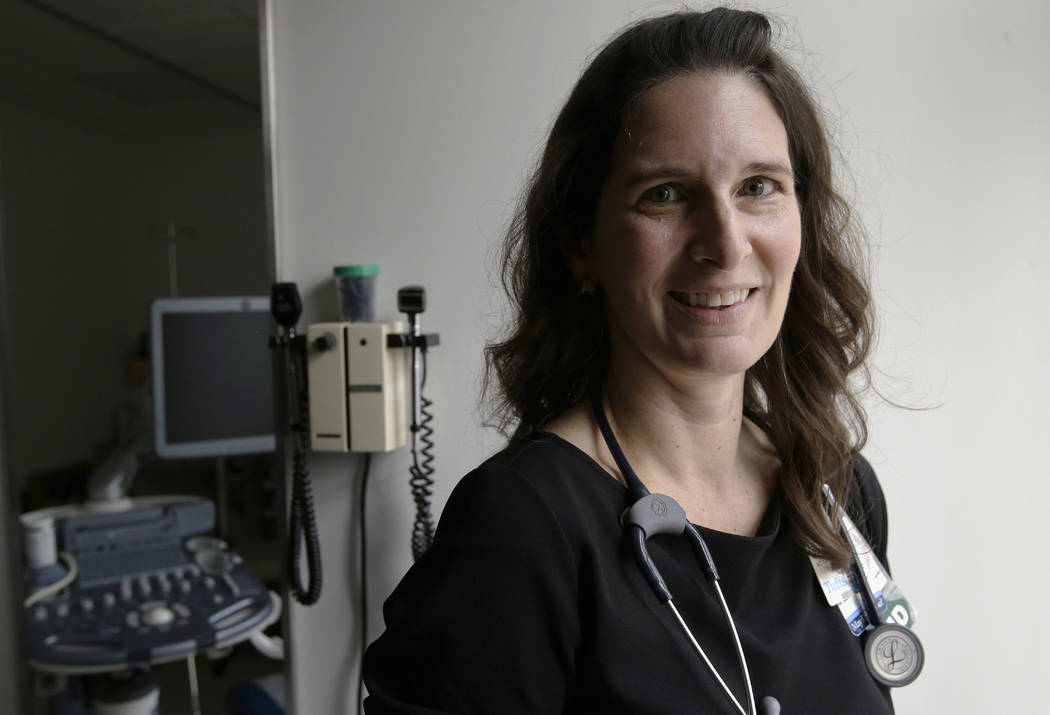Bills seek special consent for pelvic exams under anesthesia
Savanah Harshbarger estimates she performed as many as 10 pelvic exams last year on patients before gynecologic surgeries, feeling for fibroid tumors or other abnormalities.
The Duke University medical student said the experience was a revelation.
“It’s pretty empowering to know this is something you can detect with a gloved hand instead of needing an MRI or some more expensive procedure,” Harshbarger said.
What was not always clear to her was whether the patients had agreed ahead of time to have a student do the exam while they were under anesthesia. The consent form, Harshbarger said, “definitely does not mention any specific things a student might be doing. It’s fairly vague language.”
Lawmakers in a number of states now want to eliminate any question about patient consent.
Bills introduced in roughly a dozen states this year would require that women undergoing gynecological surgeries give explicit approval to a pelvic exam beforehand. It’s a step that some medical experts say is an unnecessary intrusion into patient care.
Utah’s governor signed a pelvic exam consent bill into law earlier this year. A bill in New York passed the state Senate this week and is headed to the governor, and the Maryland Legislature unanimously sent legislation to Gov. Larry Hogan, who is expected to sign it.
Maryland state Delegate Heather Bagnall said the state’s teaching hospitals have informed consent as a best practice, but she felt it needed to be made explicit in state law to protect women undergoing surgery and as an assurance for medical students.
“So we have basically just spelled out in no uncertain terms, if a patient is going under anesthesia, if a patient is unconscious, that they have to have given consent for these exams,” Bagnall said. “They need this added level of protection, and they need this added level of peace of mind.”
During a committee hearing on the bill, Melanie Bell, a board member for the Maryland Nurses Association, said there have been times when patients have awakened during the procedures and felt violated.
“Clinical experiences are necessary and are important, and we must learn in a hands-on environment when we’re students,” she said. “However, we must treat patients with dignity and respect.”
A pelvic exam is standard practice before gynecologic surgeries to determine the position and mobility of the organs. It involves inserting fingers of a gloved hand in the patient’s vagina to feel her uterus and ovaries. Medical students sometimes do the exams as part of their training.
What’s not clear is how often patients are clearly told of student involvement ahead of time.
In general, the bills introduced this year would require explicit informed consent before a medical student is allowed to perform a pelvic exam on an anesthetized patient. Some would require the exam to be related to the planned procedure.
Not everyone believes the legislation is necessary.
Yale Medical School asked Connecticut lawmakers to rely on medical societies to set clear standards designating when it’s medically appropriate or necessary to conduct a pelvic exam on an anesthetized patient. The school cautioned lawmakers against legislating clinical decision-making and helped persuade them to shelve the bill.
In New Hampshire, the House killed legislation after its health committee said it heard extensive testimony and found that the practice of informed consent is already in place.
Even in Utah, which this year became the seventh state with a pelvic exam consent requirement, some in the medical community said the legislation wasn’t needed.
The Utah law requires a separate consent form that includes the words “CONSENT FOR EXAMINATION OF PELVIC REGION” in no smaller than 18-point type. It defines a patient examination as a “medical examination that requires contact with the patient’s sexual organs.”
At the state’s largest teaching hospital, the new paperwork won’t change the practice, said Dr. Robert Silver, department chair of obstetrics and gynecology at the University of Utah Hospital.
The law addresses a problem that doesn’t exist, he said, because patients already are asked and give their permission before a medical student does a pelvic exam.
He noted one concern with the new law: It requires the consent form to include a checkbox giving a patient the option to refuse a pelvic exam from anyone before surgery, including the surgeon. If a patient chooses that option, Silver said, the surgery wouldn’t be possible.
The Association of American Medical Colleges has denounced pelvic exams without specific consent as “unethical and unacceptable,” and many medical schools and teaching hospitals say they have revised their policies to require it. The American College of Obstetricians and Gynecologists has had a strongly worded statement on the topic since 2011, urging specific informed consent before surgery.
Even so, several medical students from different schools told The Associated Press that they had recently performed pelvic exams on anesthetized women but were uncertain how much the patients knew beforehand. They wondered whether or not they were acting ethically.
To allay such concerns, Tufts Medical Center in Boston recently revised its consent form.
Doctors discuss the forms with gynecology patients, inform them that students may participate in pelvic exams and ask for consent, said Dr. Laura Baecher-Lind, an obstetrician and gynecologist and the hospital’s director of women’s care.
But medical students may not be present for that conversation. In response to concerns circulating on social media and an inquiry from a prospective medical student, her department is changing its form to add “exam under anesthesia.” She hopes that will clarify to medical students that it’s been discussed with patients.
“Our processes are sound except for the documentation of that conversation” with patients, Baecher-Lind said.
A 2018 essay on the topic in the journal Bioethics appears to have sparked the current wave of social media buzz, columns and, in turn, legislative proposals.
The author, Phoebe Friesen, decided to pursue the topic after discussing ethical issues with medical students at Mount Sinai Hospital in New York. Some felt the consent obtained from patients before gynecological surgery wasn’t specific enough about student involvement. Others said they were unclear about it because they weren’t in the room when the patient signed consent forms, but feared speaking up.
Friesen’s essay and a related opinion piece she wrote for the online magazine Slate came amid the #MeToo movement and provided momentum for Robin Fretwell Wilson, a University of Illinois law professor who has pushed for pelvic exam consent laws for nearly 20 years.
“I have been trying to basically light a fire over this,” Wilson said.
She said medical students are afraid to talk about the issue and that patients have no way of knowing what happens while they’re unconscious.
“We can’t be sure that norm is being respected,” Wilson said, explaining her continued push for state legislation.
Among the bills is the one in New York, sponsored by Democratic state Sen. Jessica Ramos. Her bill would amend the public health law to establish informed consent for medical procedures during education or training. It passed the Senate earlier this week and was sent to Gov. Andrew Cuomo.
Ramos said it’s “of utmost importance” to instill the value of informed consent on medical students in New York.
Democratic state Sen. Roxanne Persaud worked on similar legislation and supported the bill that ultimately passed. She said her office has received calls from women wondering how they could find out if they had a pelvic exam while under anesthesia that was performed by medical students. She wonders if she also had one during surgery a decade ago.
If an informed consent requirement becomes law, Persaud said, “It’ll be a victory for women.”
———
McDermott reported from Providence, Rhode Island. Johnson reported from Seattle.
———
Associated Press writers Susan Haigh in Hartford, Connecticut, David Klepper in Albany, New York, Holly Ramer in Concord, New Hampshire, and Brian Witte in Annapolis, Maryland, contributed to this report.





















